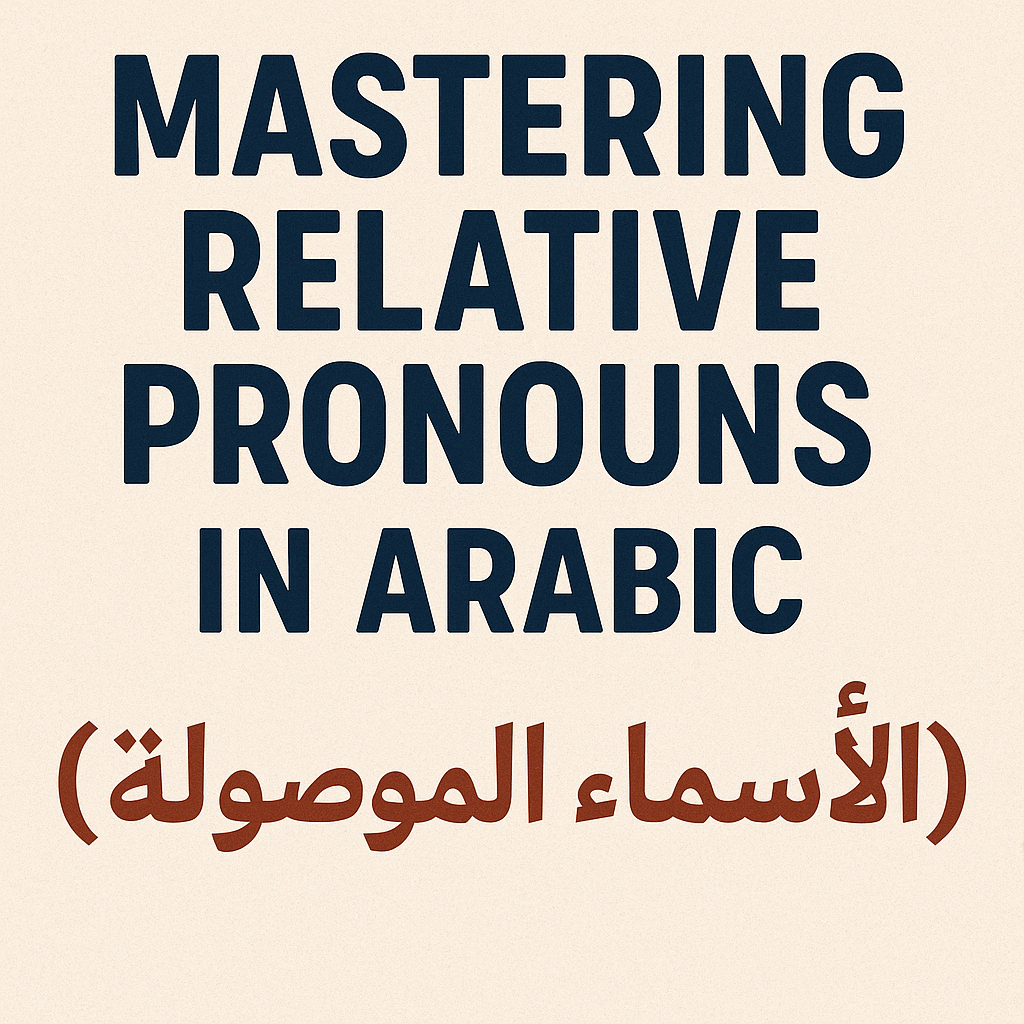Mastering Relative Pronouns in Arabic (الأسماء الموصولة)

Learning Arabic can be a rewarding journey, but mastering its grammar nuances, such as Relative Pronouns in Arabic (الأسماء الموصولة), is essential for achieving fluency and expressing complex ideas clearly. Whether you are a beginner or an intermediate learner, understanding how relative pronouns work in Arabic will significantly enhance your reading, writing, and speaking skills.
In this blog, we will explore everything you need to know about Relative Pronouns in Arabic (الأسماء الموصولة)—their types, uses, and how to integrate them naturally into your sentences. Plus, we’ll introduce you to Al Arabiya Institute, one of the best websites offering Arabic online courses with competitive prices and free trial lessons to help you master these grammar points effectively.
What Are Relative Pronouns in Arabic (الأسماء الموصولة)?
Relative pronouns are words that connect a relative clause to a main clause, providing more information about a noun. In English, words like “who,” “which,” “that,” and “whom” serve this function. Similarly, Arabic has its set of relative pronouns known as الأسماء الموصولة.
These pronouns are crucial because they help form complex sentences and enrich your language expression. Instead of breaking ideas into multiple short sentences, relative pronouns allow you to combine them into fluid, meaningful phrases.
The Main Relative Pronouns in Arabic (الأسماء الموصولة)
Arabic relative pronouns are unique in their form and usage compared to English. The most common relative pronouns in Arabic are:
1. الذي (Alladhi)
Used for masculine singular nouns.
Example:
الرجلُ الذي قرأتُ عنه كتابًا
(The man who I read a book about)
2. التي (Allati)
Used for feminine singular nouns.
Example:
الفتاةُ التي تدرس في الجامعة
(The girl who studies at the university)
3. اللذان / اللذَيْن (Alladhān / Alladhayn)
Used for masculine dual nouns, depending on their grammatical case.
Example:
الرجلان اللذان حضرا الاجتماع
(The two men who attended the meeting)
4. اللتان / اللتين (Allatān / Allatīn)
Used for feminine dual nouns, depending on their grammatical case.
Example:
الفتاتان اللتان شاركتا في المسابقة
(The two girls who participated in the contest)
5. الذين (Alladhīna)
Used for masculine plural nouns.
Example:
الطلابُ الذين نجحوا في الامتحان
(The students who passed the exam)
6. اللواتي / اللاتي (Allawāti / Allātī)
Used for feminine plural nouns.
Example:
النساءُ اللواتي حضرن الحفل
(The women who attended the party)
How to Use Relative Pronouns in Arabic (الأسماء الموصولة)
Unlike English, where relative pronouns often come with relative clauses introduced by “who,” “which,” or “that,” Arabic relative pronouns function as attached words that refer back to the noun. The relative pronoun agrees in gender, number, and case with the noun it modifies, but it never takes the definite article “ال” by itself; it always appears as one of the forms mentioned above.
Example Sentences:
-
الكتابُ الذي قرأته مفيد
(The book that I read is useful.) -
المدرسةُ التي تقع في المدينة كبيرة
(The school which is located in the city is big.) -
الطلابُ الذين يجتهدون يتفوقون
(The students who work hard excel.)
Why Mastering Relative Pronouns in Arabic (الأسماء الموصولة) Is Important
1. Improves Sentence Complexity and Flow
Using relative pronouns allows you to form longer, more connected sentences instead of fragmented short ones. This makes your speech and writing sound more natural and sophisticated.
2. Enhances Reading Comprehension
Arabic texts—whether classical literature, modern media, or religious texts—frequently use relative pronouns. Mastering them helps you understand these sources accurately.
3. Boosts Speaking and Writing Skills
Being able to combine ideas smoothly by using Relative Pronouns in Arabic (الأسماء الموصولة) will give you confidence in conversations and writing, making your Arabic more native-like.
Common Mistakes to Avoid When Using Relative Pronouns in Arabic (الأسماء الموصولة)
Even advanced learners sometimes stumble with relative pronouns in Arabic. Here are some pitfalls to watch out for:
1. Mismatching Gender or Number
Make sure the relative pronoun matches the noun it refers to in gender (masculine/feminine) and number (singular/dual/plural).
Wrong:
الرجال التي حضروا (Wrong because “التي” is feminine, but “الرجال” is masculine plural.)
Correct:
الرجال الذين حضروا
2. Incorrect Case Endings
Arabic relative pronouns change their form depending on the grammatical case (nominative, accusative, or genitive). Pay attention especially with dual forms.
3. Using Definite Article Incorrectly
Relative pronouns always include the definite article “ال” inherently and are attached forms. Avoid adding an extra “ال” or removing it.
Tips for Practicing Relative Pronouns in Arabic (الأسماء الموصولة)
-
Read Arabic texts regularly and highlight all the relative pronouns to see them in context.
-
Write sentences using different forms of relative pronouns to strengthen your understanding.
-
Practice speaking by describing people, places, and things with relative clauses.
-
Take quizzes and exercises focusing on relative pronouns to test your mastery.
For structured learning and expert guidance, consider enrolling in Arabic online courses at Al Arabiya Institute, which offers comprehensive lessons on grammar topics like relative pronouns. With the best prices and free trial lessons, it’s one of the best websites to advance your Arabic skills efficiently.
How Al Arabiya Institute Can Help You Master Relative Pronouns in Arabic (الأسماء الموصولة)
At Al Arabiya Institute, our courses are designed by experienced teachers who understand the challenges of learning Arabic grammar for non-native speakers. Our lessons on Relative Pronouns in Arabic (الأسماء الموصولة) include:
-
Clear explanations with examples.
-
Interactive exercises to practice each pronoun type.
-
Personalized feedback to correct mistakes.
-
Flexible online classes that fit your schedule.
We focus on practical usage so you can confidently use relative pronouns in conversations, writing, and reading comprehension.
Final Thoughts on Relative Pronouns in Arabic (الأسماء الموصولة)
Mastering Relative Pronouns in Arabic (الأسماء الموصولة) is a critical step toward fluency. These small words connect ideas, making your Arabic more fluid and expressive. By understanding their forms and practicing regularly, you can greatly improve your language skills.
Remember, learning grammar is easier with the right support. Visit Al Arabiya Institute today, one of the best websites offering Arabic online courses with the best prices and free trial lessons. Join thousands of learners who have improved their Arabic with our expert guidance!
If you want to receive more tips on Arabic grammar or explore other challenging topics, stay tuned to our blog at https://learning-arabic.com/. And don’t forget to try a free lesson at Al Arabiya Institute to experience firsthand how effective and enjoyable learning Arabic online can be!
👉 Visit Al Arabiya Institute and book your free trial lesson now!








